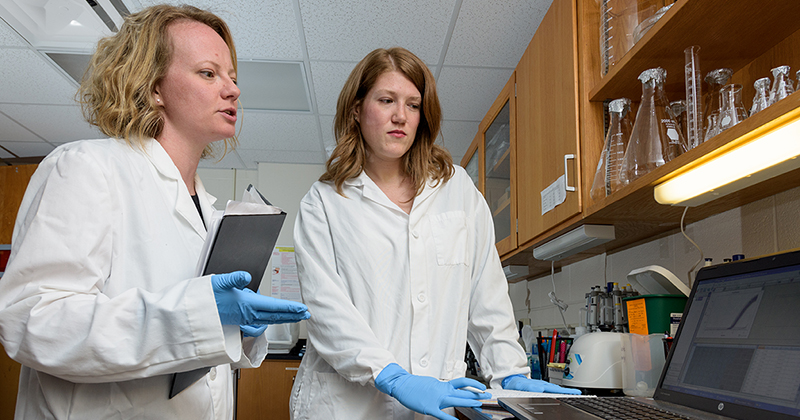
Graduate Programs

Training the next generation of researchers
The Department of Psychological & Brain Sciences at the University of Delaware is committed to educating and training the next generation of researchers, advanced educators and leaders. Our overarching purpose is to provide the skills required to design, conduct, and evaluate psychological research, with the expectation that students will pursue research or teaching careers in academic, medical, business and industrial settings as appropriate.
Our graduate program is integral to both our research and educational mission, and we aim to provide rigorous training experiences that span coursework, scholarship, instruction and community involvement.
We invite you to learn more about our programs and research. See the concentration area pages for behavioral neuroscience, clinical science, cognitive psychology, and social psychology for a list of faculty recruiting graduate students for the 2024–2025 academic year.
Explore our graduate programs
The Department of Psychological & Brain Sciences at the University of Delaware offers an M.S. in clinical psychological science, a 4+1 degree and a Ph.D. degree in psychological and brain sciences. Five concentrations of graduate training play a prominent role in the Ph.D. program: behavioral neuroscience, clinical science, cognitive psychology, social psychology, and interdisciplinary neuroscience.
CERTIFICATE PROGRAMS
Psychological and brain sciences students may structure their elective coursework so that they are recognized for additional specialized study that cuts across behavioral neuroscience, clinical science, cognitive psychology and social psychology concentrations.
The department offers the following graduate-level certificate programs: Developmental Processes; Quantitative Analysis; and Social, Cognitive, and Affective Neuroscience. The certificate programs are open to any current graduate student in any program at the University of Delaware.
DELAWARE BRIDGE PROGRAM
In this two-year, post-baccalaureate fellowship program, students from underrepresented groups are trained to apply data science to the study of the brain and behavior.
Faculty Mentorship
Faculty advisors are actively engaged in mentoring graduate students, and empowering students to pursue independent research interests. Our faculty mentors have authored hundreds of research publications, are influential in prestigious organizations and editorial boards around the world, and consistently attract major funding from leading national agencies.
An Interdisciplinary Community
The structure of our program emphasizes interdisciplinary and collaboration within the Psychological and Brain Sciences Department and beyond. Within the University, students in our department may earn a doctorate in neuroscience through the campus-wide Interdisciplinary Neuroscience Graduate Program. Beyond the university, faculty and students collaborate with researchers from institutions such as Johns Hopkins University, University of Maryland, University of Pennsylvania, Temple University and the National Institutes of Health (NIH). They also work with leading healthcare centers, including Thomas Jefferson University Hospital, Nemours Alfred I. duPont Hospital for Children, and Christiana Care Health System.
Funding
Students in good standing in the program typically receive support throughout their time at UD. This support may come in the form of a department teaching assistant or research assistant position, a University fellowship, or a research assistant on an advisor's extramural grant. Students are strongly advised to consider applying for external funding (e.g., an NSF Predoctoral Fellowship or an NRSA Predoctoral Fellowship from NIH) and to discuss the application with their advisors well in advance of the due date. The Department offers travel and dissertation awards as well as smaller funds for miscellaneous research expenses.
Why choose the University of Delaware?
The University of Delaware offers 11 graduate programs ranked among the top 50 best in the nation. Centrally located between New York City and Washington, D.C., UD is driven by a rare combination of Land Grant, Sea Grant and Space Grant missions—with a legacy of innovation and service stretching back more than 275 years.
The deadline for graduate applications is April 1. We admit students for fall admission only.
For more information regarding the criteria for admission please refer to the Graduate College website. For more information regarding the Graduate College application process please refer to Applying to UD.
Admission requirements
- Minimum GPA: 3.0 in a bachelor’s degree from an accredited institution.
- Required Coursework: Introductory courses in psychology, research methods, measurement, and statistics are essential. Additional coursework in affective, biological, cognitive, social, and developmental psychology is strongly recommended.
Application Deadlines and Information
The deadline for graduate applications is December 1. We admit students for fall admission only. We generally schedule campus visits and interviews in January.
For more information regarding the criteria for admission please refer to the Graduate College website. For more information regarding the Graduate College application process please refer to Applying to UD.
Criteria for Admission
Students are admitted directly to the doctoral program. A combination of criteria are used in evaluating candidates for admission to graduate study in psychology.
- Undergraduate and/or graduate coursework and grade point average
- Research experience
- Personal statement
- Letters of recommendation
- In some cases, a personal interview.
- OPTIONAL: Scores on the GRE (Graduate Record Examination)***
***Application process update
The Department of Psychological & Brain Sciences is waiving the GRE requirement for our graduate program. If you wish to apply without a GRE score, please enter a future GRE exam date into the application. It need not be a legitimate exam date. Entering a future exam date causes the system to finish your application and send it on to our review committee where it will receive full consideration.
Clinical science concentration applicants, please note: The Psychology Subject GRE is not required and will not be used for evaluation purposes during the admission process. However, it is helpful for fulfilling clinical science program requirements, and students who enroll in our program may choose to take the test any time before the end of their first year.***
International Students
Foreign students whose language of education is not English must also arrange to have original TOEFL scores submitted; a minimum score of 100 on the IBT (600 on the paper-based test, or an equivalent IELTS score of 7.0) is required for admission. Foreign students who hold a university degree from an institution in an English-speaking country are not required to submit TOEFL scores. Foreign students whose native language in not English and who are awarded a teaching assistantship must successfully complete the University's ITA program.
Meeting the Requirements
Those who meet these requirements are not guaranteed admission, nor are those who fail to meet the requirements necessarily precluded from admission, if they offer other appropriate strengths. Research experience is looked upon favorably. An undergraduate degree in psychology is not required for admission, but students may be required to make up deficiencies in their background by enrolling in appropriate courses.
Application Essay 1:
The University of Delaware and Department of Psychological and Brain Sciences has a long tradition of academic excellence. Upload an essay that addresses each of the following:
- Outline how your proposed plan of graduate study and scientific research experiences relate to your career goals.
- Describe your interest in working with a particular faculty member(s) or lab group (e.g., What about this faculty member’s research is a good fit with your career goals or research interests?)
- Describe how your previous experiences and skills (broadly defined, which could include work, academic, research, internship, extracurriculars, etc.) have prepared you for success in graduate school or may contribute to your future academic pursuits.
- Address any special circumstances that you feel we should know about (e.g., Were there any personal, social, economic, physical, or academic obstacles or challenges that had a significant impact on your educational performance or research experience?)
Application Essay 2:
The University of Delaware’s Department of Psychological and Brain Sciences is committed to supporting the diversity of the graduate student body and promoting access and opportunity in higher education. A diverse student body is an essential component of academic excellence as we train future scientific leaders, educators, and clinicians to operate within and serve a diverse population. The purpose of this essay is to get to know you as an individual and potential graduate student. Please use this statement to describe how you can contribute to the inclusivity of graduate education, our university community, and the field of psychology. You may discuss how you could broaden the participation of underrepresented and underserved groups in society through your lived experiences or in other ways. You may include educational, cultural, social, familial, nationality, immigration status, or economic opportunities and disadvantages that you have experienced, and ways those experiences have affected the development of your career plans and graduate school goals. This statement can also include ways that you have initiated or participated in outreach and services designed to further educational, cultural, and economic equity.
Assistantships and fellowships at the University of Delaware consist of full tuition plus a stipend. For more information, please refer to the UD Graduate Catalog, Graduate Fellowships and Assistantships. Renewal of funding packages each year depends on satisfactory progress toward the degree. Read the University's funding policies.
The Graduate College at the University of Delaware is responsible for policies related to the implementation of stipends and tuition scholarships. See the Graduate College Funding Opportunities page for more information.
Graduate students may apply for travel awards from the Graduate College, which are funded by the Office of the Provost.
Visit the Graduate College's Emergency Support page for resources available to students experiencing financial hardships or mental health issues.
Please visit UD's Student Financial Services for tuition and related fees (subject to yearly change).
The department's graduate program policy statement specifies degree requirements, policies, and procedures for psychological and brain sciences graduate students. The statements are reviewed and approved by the Faculty Senate's Graduate Studies Committee.
Psychological & Brain Sciences Graduate Program Policy Statements
Visit UD's Center for Global Programs and Services for information on resources.
The University of Delaware holistically supports its graduate students, beginning with their health and wellbeing. Benefits include a subsidized health plan and physical and behavioral health services. UD fosters a culture of academic excellence, with committed faculty and staff and access to state-of-the-art research facilities and technology. UD prioritizes professional development with job training, internships and industry partnerships. Graduates further enhance their professional growth and visibility with opportunities to work on interdisciplinary research teams, present their work at conferences and publish in academic journals. Visit the links below to learn how UD is supporting society’s future leaders, scholars, and innovators.








